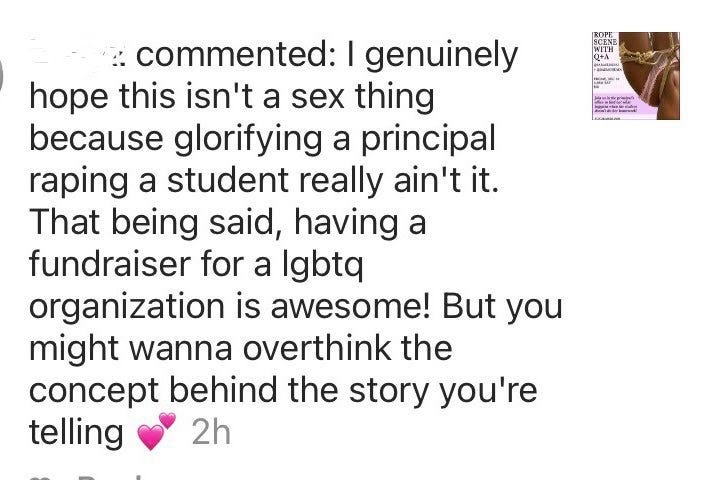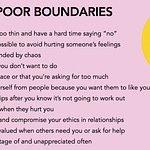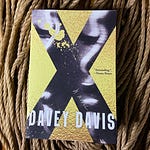content warning: age play, incest play, consensual non-consent
A few weeks ago my girlfriend and I were in the planning stages of a live rope event we hosted together virtually. We knew we couldn’t do anything too risqué because zoom monitors for adult content (luckily a lot of SM isn’t “traditional sex” so it scrapes by the respectability algorithms). As the point of a fundraiser is to get as much money as possible by appealing to a wide audience, “What’s our scene going to be?” was a hard question to answer. Both Sara Elise and I do not like to filter ourselves for anyone, but when our private scenes usually consist of her pretending to be 1.) A Sex Doll, 2.) A Child, 3.) A Murder Victim, with me pretending to be 1.) An Evil Doctor, 2.) A Creepy Old Man, 3.) A Serial Killer (also a man) you can see why we may have run into some brainstorming trouble with our mainstream marketability.
“I can be a teen and you can kidnap me…”
“Nope. That will offend a lot of people.”
“Wait, why?”
“Age play. CNC… We would need to trigger warning the fuck out of it.”
“Okay how about I can be a school girl and you can be my mean teacher who punishes me?”
“Nope. That will offend a lot of people.”
“Ugh, why?”
“Age play. Torturing children...”
“Wow ok, so we can’t have fun if we want to sell tickets? Great. What can we do?”
I had deja vu from last year when this same conversation happened. We were brainstorming for a Halloween performance at Venus Cuffs’ House of Screams event. I was coming up with a plethora of similar accidentally “offensive” ideas for our scene, but this time she was the one explaining why they wouldn’t work. “I want to dress like the scary nun from the Conjuring 2. You can be a child on the playground playing with a ball and I torture and possess you…” She steered us in the less offensive direction of a (sexy) backwoods butcher who tortures a lost backpacker of unknown age (but still in a Catholic school uniform) who stumbles into the butcher’s creepy barn.
For the virtual event last week, we ended up settling on a Principal/student scene between two real-life consenting adults over the age of thirty. The student got sent to the principal’s office for violating the dress code with her six-inch long tartan skirt and good, old fashioned torture ensued. “We swear, we swear,” we told our audience, “the student just turned eighteen so everything in the fantasy world we created that’s not even real was completely legal!” It felt like a compromise between what we actually wanted to do and what we felt would have appealed to a majority of the freaks who follow us on social media. BUT...
The following was a comment on the instagram post announcing our virtual event (on Sara Elise’s instagram):
I have no idea who this person is, but kinky or not it is so common for people to jump to these wild conclusions that surface a deep misunderstanding of fantasy as being a stand-in for our real life desires. If this had been a serial killer scene with no mention of a student/teacher dynamic, would the “glorification of murder” be more acceptable for this person? As I’ve written about before, sometimes sexual fantasies and role playing can lead us directly to our truth, but most of the time they absolutely do not. There are so many examples of this. Do people that watch tentacle porn want to be fucked by an octopus? Most of them would say not. So many people shut off their own fantasies and desires due to shame that they can’t comprehend being interested in playing sexy pretend. Actually, let’s back up—I simply want people to stop thinking “Do they actually want to do these things in real life?” and replace it with “It’s just consenting adults playing make believe and no one is being harmed.”
Because the title Daddy is somehow culturally divorced from any connection to age play, it’s wild that I can say “I’m Daddy,” and even have complete strangers calling me Daddy (which I don’t consent to by the way), with absolutely no projection of Bad Things onto me. Age play by name, however, is something I don’t talk about “publicly” very often, not because I’m ashamed of myself, but because in my experience it’s one of the most widely misunderstood aspects of role playing and power dynamics in BDSM. As evidenced above, people completely lose their shit. I don’t trust the average person not to project these Bad Things onto me, even if I am playing the role of educator. And even when I am educating in private one-on-one lessons, I still have people disgusted by the thought of participating in this type of role play because they make their own giant leap to associate an adult consensual fantasy with actual children. This is not even remotely close to that. It’s not a stand in for that. Just no.
Speaking for myself and my experience, I landed here upon accepting that I get off on role playing extreme power imbalance, societal taboos, and corruption of the innocent (again, all fantasy between consenting adults). As the Top/Domme in these situations, I’m the extreme sicko in charge of the corruption, which for me is part of the fun. However, if people think the concept of age play is disgusting, they absolutely place that disgust onto the D in these situations. I become morally corrupt as the active partner in these fantasies while the submissive/receptive bottom usually gets away with pity—”You poor thing, what happened to you as a child?”
I recently listened to a psychology podcast talking about BDSM where they mention various role playing scenarios that people engage with because they are working through trauma. There are people who believe that engaging in the more “taboo kinks” is okay if it’s done by those trying to reclaim power that was stolen from them. This means that consensual non-consent, age play, or incest play are done by people who have survived those specific traumas, are engaging in exposure therapy, and therefore have psychological merit. This is labeled as “Safe, Sane, Consensual.” This reeks of respectability. Expressions of sexuality that are considered fringe or edge don’t need to be tied to traumatic events. It’s almost like this brand of “healing” BDSM is okay, but otherwise the filthy “insane” perverts are giving everyone else a bad name.
People tell themselves a lot of things in order to be okay with what they’re doing, I just wish they would be a little more self-aware while doing it. There’s so much bleaching happening that sometimes I wonder if people even understand that at its foundation BDSM is actually about power and pain, not respectability or healing. If you’re not fucking with power you may as well be having vanilla sex, and that’s ok, just please call it what it is.
Daddy/boy and Mommy/girl (sadly, it’s much harder to find writing about M/g), and their variations are Leather archetypal roles. These are often longer-term power exchange relationships usually entered into by a Dominant-type who takes on some form of caring, guiding, training, and/or mentoring for a submissive-type partner who seeks the same. Pouring over my books on Leather culture and relationships written mostly by men and before 1995, Daddy/boy relationships are never described as age play. I’m not sure if the word didn’t exist yet, actual age regression wasn’t common, or this label just wasn’t necessary because that aspect was already understood. Daddies are described as caring and loving wards of their boys, often portrayed in contrast as childlike, eager to learn, be good, and please their Daddies.
Blade T. Bannon wrote a handbook for Daddies and boys called “My Mentor My Guide” that provides wonderful real-life examples of this Mentor/mentee relationship. The perspective in this book (in contrast to Bean, mentioned below) includes an inherent age gap where Daddies are always older, sometimes twenty or thirty years older, than boys. The last chapter, written by Andrew Cline, discusses the psychology of what it means to reparent through the Daddy/boy relationship. As I mentioned, I tend to stay away from psychology when I talk about BDSM, but I enjoy understanding corollary benefits to my perversion. It is common to form Leather familial bonds of chosen parents, siblings, etc where we get the love, care, guidance, and acceptance that these culturally significant relationships may never have afforded us. We shouldn’t look for a Daddy with the intention of healing from having a shitty biological father, but we also can’t deny the possibility.
“Most men who engage in Daddy/son role play want the fantasy, not actual incest. The thought of sex with one’s actual biological father is often distasteful in the extreme. In my opinion, for most Daddy/son role play, the “Daddy” may be a surrogate of some sort, but there is also an element of transformation and re-creation that eliminates the anger, hostility, and conflict often present in actual father/son relationships. Daddy/boy role play usually involves lots of verbalizing feelings. Just using the taboo words “Daddy” and “boy” can be powerfully erotic.”
Leathersex by Joseph W. Bean outlines Daddy/boy in a section on Leather Relationships. He explains that the Daddy/boy relationship is a power dynamic that has evolved from strict M/s that was more popular in previous years (Old Guard). Daddy/boy dynamics, in contrast, allow for loving romantic relationships. “So the shifting of social acceptance in the gay community and the world has contributed to the redefinition of acts, attitudes, and clothing in such a way as to support- but by no means create-the rise in popularity of the Daddy-boy relationship.” In this section he interviews his own boy Scott about what boyhood means to him.
Q: What do you mean when you say you are a boy?
Scott: Being a boy means I have the freedom to play, a safe place to do it, and a Daddy, which means lots of love and a nurturing relationship with a lot of growth. It means getting to wear silly clothes, and someone else takes the blame for them. It's permission to be silly sometimes.
Q: Does a boy have to be young?
Scott: No. A boy can be any age, which is good for older boys who like young men.
Q: Does a boy have to be childlike?
Scott: No. A boy should have the ability to be childlike when appropriate, but he also has to be able to function as a normal, human, male adult.
Q: What does a man need in order to be a boy?
Scott: Honesty. A sense of fun. A need for a strong "father figure" in his life even if he has a good relationship with his father, and a desire to learn from and be like "said strong person." Oh, and a good hot butt.
Q: What kind of satisfaction can you get from being a boy, since a boy seems to always be serving someone else's needs?
Scott: You can get the joy of a job well done and the love of a good Daddy. And, really, it works out pretty well if you have the right Daddy. Like, if you don't want to do the fucking, don't want to stick your dick in someone else, you can have a Daddy, and he'II do that for you.
Let’s circle back around to the fact that age play, and similarly incest play (overlapping in this case), invoke moral panic knee-jerk reactions from the same people who enthusiastically call sexual partners Daddy, or good girl. Where did this connection to meaning break in the diffusion of Daddy from Leather culture to more popular kink culture? It is possible that I’m tracing these origins to the wrong place. I get that it’s very easy to draw hard limits at things that disgust you while brushing up against those things in a very real way. The point is that people either don’t think about what they’re doing at all to the point of denial, they think about it through a lens of pathologization and shame, or somehow an impressive combination of both.
Someone asked in the Principal/student rope event last week why age play is so stigmatized. My reaction was “Oh, come on. You know the answer to that!” To that person, if you’re reading this, I hope this explains better than my frustrated dismissal of your question. Mostly, I don’t know, maybe we could all just stop sucking the fun out of being perverts?














